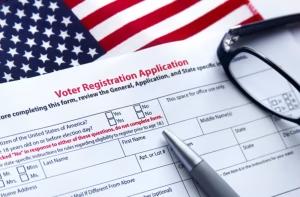Michigan Judge Dismisses GOP Challenge to Overseas Voting Rights
In a controversial and shocking decision, a Michigan judge has dismissed a Republican initiative aimed at restricting voting rights for certain Americans residing abroad. The ruling, which has significant implications for U.S. citizens living overseas, came from Michigan Court of Claims Judge Sima Patel on Monday.
The case was initiated by the Republican National Committee (RNC), which argued that Michigan's election regulations improperly allowed U.S. citizens who have never lived in the state—yet have relatives from Michigan—to participate in elections. The RNC contended that this practice undermines the electoral process and dilutes the votes of actual Michigan residents.
Judge Patel's ruling reaffirmed that the provisions in question comply with both federal and state laws. In her decision, she stated, "There is no basis for invalidation," effectively upholding the voting rights of overseas citizens. Michigan Secretary of State’s election officials' manual supports this ruling, clarifying that a U.S. citizen who has never resided in Michigan can vote in the state if they have a parent, legal guardian, or spouse who last lived there, and they have not registered or voted in another state.
The implications of this ruling have stirred significant backlash from GOP leaders. RNC Chairman Michael Whatley expressed deep concern, stating that Michigan residents should not have their votes overshadowed by those who have never lived in the state. “We are committed to safeguarding every legitimate vote, including those from military and overseas citizens, to ensure they are not overshadowed by ineligible votes,” emphasized Claire Zunk, the RNC's communications director for election integrity.
In response to the ruling, the RNC has announced its intention to appeal, vowing to continue the fight for what it perceives as the integrity of Michigan's electoral process.
The stakes are high. According to the Federal Voting Assistance Program, approximately 2.9 million U.S. citizens living abroad were eligible to vote in the 2020 elections. However, participation rates were dismally low, with less than 8% casting their ballots. This case has opened the floodgates to broader discussions about voting rights, representation, and the impact of overseas citizens in American elections.
As the political landscape continues to evolve, this ruling raises critical questions about the balance between safeguarding electoral integrity and ensuring that all eligible citizens, regardless of residency, can make their voices heard in the democratic process.
Related: The US Justice Dept sues Virginia for violating federal election law





















